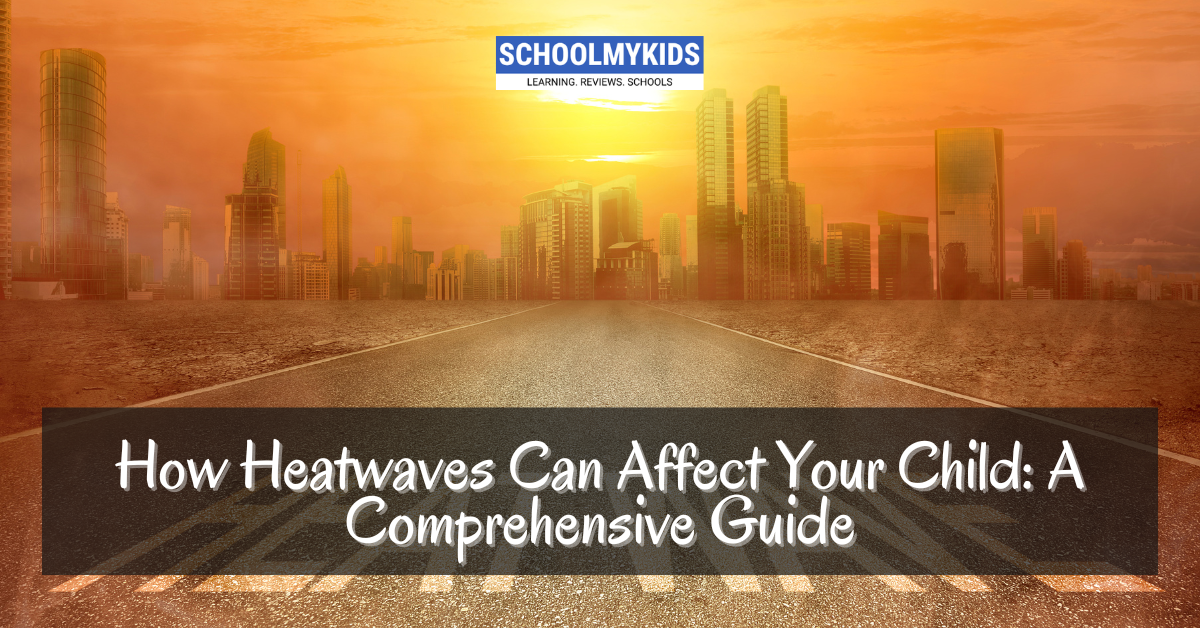Heatwaves can have a profound impact on children’s health and well-being. Understanding these effects and knowing how to mitigate them is crucial for parents. This detailed guide covers how heatwaves can affect your child, the symptoms to watch for, and essential tips to keep them safe and comfortable.
1. Understanding Heatwaves: What Parents Need to Know
What is a Heatwave? A heatwave is a prolonged period of excessively hot weather, often accompanied by high humidity. These conditions can be dangerous, especially for young children whose bodies are less capable of regulating temperature.
Why Are Children More Vulnerable? Children are more susceptible to heat-related illnesses because:
- They have a higher body surface area to body mass ratio, causing them to absorb heat more quickly.
- Their sweat glands are not as developed, making it harder for them to cool down through sweating.
- They may not recognize the signs of overheating or know how to respond to it.
2. Heat-Related Illnesses: What to Watch For
Common Heat-Related Illnesses in Children:
- Dehydration: Loss of fluids and electrolytes due to excessive sweating can lead to dehydration. Symptoms include dry mouth, dizziness, and dark urine.
- Heat Cramps: Painful muscle spasms caused by dehydration and loss of electrolytes.
- Heat Exhaustion: A more severe condition than dehydration, characterized by heavy sweating, weakness, nausea, and headache.
- Heat Stroke: A life-threatening condition where the body temperature rises above 104°F (40°C). Symptoms include hot, dry skin, rapid pulse, confusion, and loss of consciousness. Immediate medical attention is required.
3. Signs Your Child is Overheating: Symptoms to Monitor
Early Signs of Overheating:
- Flushed skin
- Excessive sweating
- Fatigue and irritability
- Thirst
Advanced Symptoms:
- Dizziness and fainting
- Nausea and vomiting
- Rapid heartbeat
- Severe headache
What to Do: If you notice these symptoms, move your child to a cooler place, encourage them to drink water, and apply cool, wet cloths to their skin. Seek medical attention if symptoms persist or worsen.
4. Hydration: The Key to Preventing Heat-Related Issues
Importance of Staying Hydrated: Proper hydration is vital to prevent heat-related illnesses. Children need to drink more fluids during a heatwave to replace the water lost through sweating.
Hydration Tips:
- Regular Water Intake: Encourage frequent sips of water throughout the day, not just when they feel thirsty.
- Hydrating Foods: Provide fruits and vegetables with high water content, such as watermelon, cucumbers, and oranges.
- Electrolyte Solutions: Use pediatric electrolyte drinks if your child is very active or shows signs of dehydration.
5. Appropriate Clothing: Dressing for the Heat
Clothing Tips for Hot Weather:
- Lightweight Fabrics: Choose clothes made from natural, breathable materials like cotton and linen.
- Light Colors: Light-colored clothing reflects sunlight and helps keep body temperatures down.
- Loose Fit: Loose-fitting clothes promote better air circulation around the body.
- Hats and Sunglasses: Use wide-brimmed hats and UV-protective sunglasses to shield your child from the sun.
6. Safe Outdoor Activities: Keeping Playtime Cool
Timing and Location:
- Avoid Peak Sun Hours: Plan outdoor activities for early morning or late afternoon when the sun is less intense.
- Seek Shade: Ensure play areas have shade, or create your own using umbrellas or canopies.
Cooling Strategies:
- Water Play: Set up a kiddie pool, sprinkler, or water table for cooling fun.
- Frequent Breaks: Ensure your child takes regular breaks in a cool, shaded area and drinks water.
7. Indoor Safety: Creating a Cool Environment
Maintaining a Cool Home:
- Air Conditioning: Use air conditioning to keep indoor temperatures comfortable. If you don’t have AC, visit air-conditioned public places during the hottest parts of the day.
- Fans: Use fans to circulate air, but avoid pointing them directly at your child.
- Cool Baths: Regular cool baths or showers can help lower your child’s body temperature.
8. Nutrition: Fuelling Your Child’s Body
Healthy Eating Tips:
- Light Meals: Offer smaller, lighter meals that are easier to digest in hot weather.
- Hydrating Foods: Include plenty of fruits and vegetables with high water content.
- Avoid Heavy Foods: Steer clear of heavy, greasy foods that can increase body temperature and discomfort.
9. Emergency Preparedness: Be Ready for Any Situation
Emergency Planning:
- Know the Signs: Familiarize yourself with the symptoms of heat-related illnesses.
- Emergency Contacts: Keep a list of emergency contacts, including your pediatrician, and local emergency services.
Indian Emergency Numbers:
- Emergency Services (Police, Fire, Ambulance): 112
- National Emergency Number: 108
- Child Helpline: 1098
- Medical Helpline: 102
First Aid Kit:
- Ensure your first aid kit is stocked with supplies for treating heat-related illnesses, including rehydration solutions and cooling packs.
Conclusion
Heatwaves can significantly impact children’s health, making it essential to take proactive measures to protect them. By understanding the risks, recognizing symptoms of heat-related illnesses, ensuring proper hydration, dressing appropriately, and creating a safe environment, you can help your child stay cool and healthy during the hottest days. Stay vigilant, stay prepared, and keep your kids safe this summer









Be the first one to comment on this story.